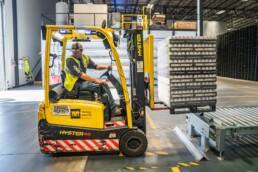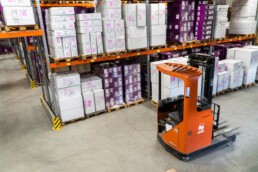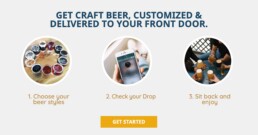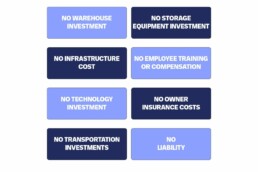How to Create a Memorable Unboxing Experience
Create a Memorable Unboxing Experience
The e-commerce industry is only becoming more and more personalized. By using clever unboxing strategies, you’re able to provide customers with a long-lasting impression of your e-commerce brand. This post will go over implementing personalized shopping, and how to create a memorable unboxing experience for customers.
What is an Unboxing Experience?
You’ve probably seen viral videos of someone unwrapping new shoes or unpacking their new winter wardrobe collection. Companies are using these “unboxing videos” for new product launches as a clever marketing tactic.
“54% of shoppers have used social media to view an unboxing picture or video.”
It takes more than a branded box and some tissue paper to provide a great unboxing experience. It’s the actual impression you provide a customer with when they buy something from your shop.
When you deliver a long-awaited purchase to a customer, the impression you leave should be carefully considered. Some of the most memorable experiences include easy-to-open boxes, personalization, handwritten thank you notes, complimentary samples, and aesthetically pleasing packaging.
Customers will be more likely to buy again if they believe they will get the same level of quality and personalization as they did the first time they made a purchase.
Why is it Important?
A buyer’s unboxing experience serves as a vital component of your brand. While it’s relatively straightforward to maintain your brand through D2C channels, it gets complicated when you sell through multiple channels and the buyer receives their order in a generic Amazon box.
Your brand will be entirely dismissed when they open an unbranded box, only to find their lonely item smooshed in with package filler. Even if the item is of exceptional quality, the unboxing experience has the potential to devalue the order’s perceived worth.

What it Can Do for Your Brand
Unboxing is the final impression you get to attract customers back as repeat buyers. Customer loyalty is built on excellent products, service, and a memorable unboxing experience.
Here are a few examples of why and how to create a memorable unboxing experience for your e-commerce brand.
Helps Your Brand Tell Its Story
Having a compelling story for your e-commerce business is critical for engaging with consumers and presenting them with a genuine reason why they should select you above other competitors. Your brand’s voice, purpose, and values should be a part of a customer’s unboxing experience. This will help them become more loyal to your company and more satisfied with their purchases.
For example, a candle company might send its customers a handwritten thank you card along with a few of their popular tea light candles as a sample.
Another example, a children’s toy company might provide brightly-colored packaging, a small discount for their next purchase, and a fun crossword for children to solve on the packaging before it’s recycled.
There are countless ways you can personalize your unboxing experience to not only tell the story of your brand but also express what is most important to your company. Personalization will connect you with your customers and provide them with an experience they will look forward to receiving again and again.
Drives Customer Loyalty
As we said above, the experience your customer has after your product leaves your hands and arrives in theirs is very important when it comes to whether or not they will make another purchase from you. Once the package is delivered to your customer you will have one last opportunity to make a positive impression and earn their continued business.
Apple is a great example of a company that provides a unique unboxing experience that drives consumer loyalty, repeat purchases, and referrals. Their packaging matches their brand’s clean, beautiful, and simple design.

“Consumers say they are 40% more likely to recommend a product to a friend if it comes in branded packaging.”
Customers all around the globe are filming their unwrapping of a new iPhone or Apple accessories, and guess what? Those videos go viral.
Going Viral
Establishing a distinct branded unboxing experience will no doubt stir up some excitement for online shoppers. Packaging that has character, aesthetic, or provides a unique experience will draw buyers to record their unboxing journey, take photos of their product, and write reviews.
60% of consumers share the content of products with premium packaging. Who doesn’t love free advertising?
As people like and share your content millions are potentially exposed to your brand and will be influenced to buy your products. If establishing an audience of online social media gurus isn’t something you want to achieve by yourself over the course of time try working with influencers.

“Youtube videos with the word ‘unboxing’ included in the title have increased by over 871% since 2010.”
Utilizing Influencers
It’s possible to reach a larger audience via online influencers who are particularly fond of unpacking videos. This could include anything from fashion and accessories to cosmetics and makeup. There is an influencer for everything and they’re waiting for you to find them.
Find someone online with a large following (20K followers or more) and a relatively high audience engagement and you can offer to recruit them, collaborate with them, or simply pay them to review a few of your items. Influencers often give honest reviews (unless paid otherwise) and will provide genuine feedback on their experience.
These details will then be shared with their following and your brand will be in front of thousands of target customers.
Although online influencers are still a relatively new concept, the rise of social commerce and the trend of influencers being integrated into big businesses is only growing with time.
If you haven’t taken advantage of utilizing the celebrities of YouTube, Instagram, and Tik Tok it’s time to start.

How to Create a Memorable Unboxing Experience
1) Represent Your Brand on All Sides
When a customer receives an order, they should know who and where it came from. Branding each side of your box will help it stand out and be remembered by your customers.
After customers open your box and have a memorable experience, they will remember your brand and be more likely to buy again. Providing that last impression increases referral likelihood.

“34% of people said the use of branded packaging affects their perception of an e-commerce brand.”
2) Include Eco-friendly Packaging
74% of consumers within the ages of 18-34 now prefer environmentally friendly packaging and will choose one brand over another because of it. This means biodegradable or recyclable packaging, minimal filler, and less waste.
People around the world are becoming more environmentally aware and are looking to support companies doing the same. By utilizing eco-friendly packing options, you’ll appeal to green consumers while also doing your part to reduce your carbon footprint.
If you want to get creative, introduce ways your packaging can be reused or repurposed in the everyday lives of your customers. This is a fun way to reduce waste and keep your brand relevant and useful for your buyers.
3) Give Something Extra
Did you know that 90% of consumers say that a free gift with their order increases their likelihood of making a repeat purchase?
While meeting the minimum expectations of customers is fine, going the extra mile can benefit your e-commerce company. Gifting customers something they didn’t anticipate can improve their entire buying experience with your company.
In addition to exceptional packaging, including free gifts can increase your chances of reviews and sharing their delight with friends over your surprise. Provide things like free samples, pins, stickers, pens, and anything else you can budget for.

4) Add a Personalized Touch
Finally, providing a personalized touch completes the buying experience. Personalized products make customers feel acknowledged, special, and not like any ordinary shopper.
Adding things like thank you cards to each order will help customers feel that personal and familiar connection to you and your brand.
Beginner’s Guide to Third-Party Logistics (3PL)
The world of e-commerce is always changing, therefore understanding the roll of Third-Party Logistics is integral to keeping up. In light of this our beginner’s guide to third-party logistics (3PL) will delve into the essential aspects, offering insights into fulfillment services, warehousing, and much more.
Read More…
We understand it might be a bit overwhelming to take on yet another form of marketing for your e-commerce brand. There are a lot of things that go into making your customer feel special, happy, and satisfied with their overall shopping experience. That’s why it’s important for us to guide you through how to create a memorable unboxing experience. It can be fundamental addition of your e-commerce brand.
If this is something you’re interested in, consider speaking to one of our Falcon professionals to see how we can deliver a unique unboxing experience to your customer. Providing you with one last solid impression for your customer without the extra stress on your shoulders.
Let’s Talk!
Mastering 2025 Gen Z Consumer Trends for E-commerce Success
Winning Gen Z in 2025 – E-commerce Strategies for a Digital Generation
In 2025, Generation Z (born 1997–2012) is reshaping the e-commerce landscape with their digital fluency and value-driven choices. With a projected spending power of $12 trillion by 2030, understanding Gen Z consumer trends is critical for retailers. These tech-savvy shoppers prioritize sustainability, authenticity, and seamless e-commerce fulfillment, making third-party logistics (3PL) providers essential allies. By leveraging 3PL shipping solutions and aligning with Gen Z’s values, businesses can thrive in this dynamic market.
Gen Z’s Digital-First Mindset
A hallmark of Gen Z consumer trends is their status as digital natives. They spend over six hours daily on smartphones, with 73% using platforms like TikTok and Instagram for product discovery. Social commerce is booming, with 80% of Gen Z making purchases based on social media recommendations. To capitalize, retailers must optimize e-commerce integration services for mobile, ensuring fast load times and order accuracy and quality control. 3PL technology solutions, like cloud-based warehouse management systems (WMS), streamline order tracking and management, delivering the same-day and next-day delivery Gen Z expects.
Sustainability as a Non-Negotiable
Sustainability drives Gen Z consumer trends, with 64% willing to pay premiums for eco-friendly products. They favor brands like Patagonia, which uses recycled materials, and support second-hand platforms like Depop, where usage grew 8% since 2022. 3PL providers enhance sustainability through packaging optimization and freight consolidation, reducing carbon footprints. For instance, cross-docking minimizes storage needs, while reverse logistics streamlines returns, aligning with Gen Z’s eco-conscious ethos. Retailers adopting supply chain optimization can meet these values without inflating costs.

Authenticity and Social Responsibility
Gen Z demands authenticity, instantly spotting performative activism. They trust influencers and micro-influencers for recommendations, with 49% relying on relatable voices. Brands like Fenty Beauty resonate by prioritizing inclusivity, offering diverse products that reflect Gen Z’s values. 3PL shipping solutions support authenticity by enabling value-added services (VAS) like personalized packaging or kitting and assembly, creating memorable unboxing experiences. Additionally, inventory forecasting ensures stock aligns with demand, reinforcing trust through on-time delivery.

Personalization Fuels Engagement
Personalization is central to Gen Z consumer trends, with 87% craving tailored shopping experiences. AI-driven inventory tracking software and demand planning allow 3PL providers to deliver customized order fulfillment solutions. For example, multi-channel fulfillment syncs dropshipping solutions with social platforms, enabling seamless order splitting and routing. Retailers using transportation management systems (TMS) can offer flexible last-mile delivery options, like buy-now-pay-later, which 55% of Gen Z use. These tools create scalable fulfillment solutions that keep pace with Gen Z’s expectations.

The Omnichannel Imperative
Despite their digital focus, 88% of Gen Z are omnichannel shoppers, blending online and in-store experiences. They value physical stores for community and convenience, often using warehousing and distribution for click-and-collect. 3PL providers enhance omnichannel strategies through fulfillment centers equipped with warehouse automation, ensuring inventory cycle counts maintain stock availability. Moreover, safety and security measures in warehousing protect goods, while freight audit and payment services optimize costs, allowing retailers to invest in e-commerce fulfillment.
Navigating Challenges with 3PL
Gen Z’s budget-consciousness, shaped by economic uncertainty, demands affordability. 3PL providers address this through freight rate negotiation and shipment consolidation, lowering fulfillment cost analysis. Additionally, vendor-managed inventory (VMI) prevents overstocking, while return merchandise authorization (RMA) processing simplifies returns, enhancing loyalty. By integrating 3PL with international shipping and import/export, retailers can tap global markets, meeting Gen Z’s appetite for unique products.
Actionable Steps for 2025
To win Gen Z, audit your supply chain management for inefficiencies. Partner with a 3PL provider offering multi-channel fulfillment and order fulfillment metrics and reporting to track performance. Prioritize customs brokerage for global expansion and carrier selection and management for reliable shipping and delivery. Finally, align with Gen Z’s values by investing in sustainable bulk shipping and transparent inventory management.
Beginner’s Guide to Third-Party Logistics (3PL)
The world of e-commerce is always changing, therefore understanding the roll of Third-Party Logistics is integral to keeping up. In light of this our beginner’s guide to third-party logistics (3PL) will delve into the essential aspects, offering insights into fulfillment services, warehousing, and much more.
Read More…
Let Us Handle It All
Gen Z consumer trends in 2025 demand a strategic blend of technology, values, and efficiency. By leveraging 3PL shipping solutions, retailers can deliver personalized, sustainable, and seamless experiences that resonate with this influential cohort. As Gen Z’s purchasing power grows, mastering these trends through fulfillment services and supply chain optimization ensures long-term e-commerce success.
Let’s Talk!
Direct Material Sourcing Optimization: Strategies for Efficiency
Direct Material Sourcing Optimization for a Competitive Supply Chain
Direct material sourcing optimization is a big concern for enterprises striving to maintain a robust and efficient supply chain. Direct material sourcing, the process of procuring raw materials, components, and finished goods from suppliers across different regions and countries, plays a pivotal role in supply chain management. This article delves into the challenges and strategies of optimizing direct material sourcing, emphasizing the importance of efficient collaboration with suppliers to manage costs, mitigate risks, and drive innovation.

The Significance of Direct Material Sourcing Optimization
Direct material sourcing serves as the foundational element of a well-functioning supply chain. It’s the starting point for the entire supply chain, and its optimization is critical to ensuring the uninterrupted flow of goods from suppliers to manufacturers and, ultimately, to consumers. The efficiency and effectiveness of direct material sourcing can significantly impact a company’s competitiveness, cost structure, and ability to respond to market changes.

Challenges in Direct Material Sourcing
1. Lack of Visibility
A prominent challenge in direct material sourcing is the lack of visibility and collaboration between companies and their suppliers. Data silos and communication barriers often prevent businesses from accessing crucial information, such as supplier risk, forward pricing, and market index impacts. This lack of visibility can lead to uninformed decision-making, resulting in delays and inefficiencies in the supply chain.
2. Supply Chain Complexity
Direct sourcing often involves procuring materials from suppliers located in different regions or countries. This complexity adds layers to the supply chain, requiring efficient coordination with multiple suppliers across various tiers. Navigating this complexity while maintaining a streamlined supply chain is a formidable challenge.
3. Cost Variability
The cost of raw materials and components can be highly variable due to factors like fluctuating commodity prices, exchange rate fluctuations, and geopolitical events. This variability makes it difficult to accurately estimate the cost of products and components, leading to pricing challenges and cost management difficulties.
4. Risk Management
Direct procurement is often more susceptible to supply chain disruptions, which can be caused by natural disasters, geopolitical events, or unforeseen circumstances. Effective risk management is, therefore, critical to minimize the impact of disruptions and ensure a continuous supply of materials.
5. Sustainability
Incorporating sustainability objectives and metrics into direct material sourcing is becoming increasingly important. Companies must track and mitigate environmental and social risks by prioritizing sustainable sourcing practices. Doing so helps reduce waste and fosters long-term business resilience in a disruption-prone world.
6. New Product Development and Innovation
Rapid product development and innovation have become constant needs in today’s market, where responding quickly to market changes is crucial. While product innovation can provide a competitive advantage, it can also create uncertainty in the supply chain, making it challenging for procurement to plan and source the necessary materials. Any disruption in the new product development process can lead to delays in production and increased costs.

Strategies for Direct Material Sourcing Optimization
To overcome these challenges and optimize direct material sourcing, enterprises should consider the following strategies:
1. Define Clear Objectives
Identify clear objectives for direct material sourcing, including desired outcomes such as cost savings, improved supplier relationships, and increased supply chain visibility. Defining clear objectives sets the direction for your sourcing efforts and ensures alignment within the organization.
2. Engage Stakeholders
Efficient direct material sourcing requires engagement with all relevant stakeholders, including procurement, supply chain, finance, and IT teams. Involving these key players ensures alignment and buy-in across the organization, promoting effective collaboration and decision-making.
3. Conduct Thorough Supplier Evaluation
Thoroughly evaluate potential suppliers, considering factors such as their capabilities, quality controls, financial stability, and compliance with relevant regulations. Supplier evaluation is a critical step in ensuring that your supply chain partners meet your standards and requirements.
4. Establish Clear Processes and Procedures
Develop clear and efficient processes and procedures for direct material sourcing. This includes activities such as supplier onboarding, contract negotiation, and supplier performance management. Well-defined processes help maintain consistency and efficiency in the sourcing process.
5. Measure and Track Performance
Regularly measure and track performance against established objectives and metrics. By continuously monitoring performance, you can identify areas for improvement and work with suppliers to address any issues. This ongoing assessment ensures that your sourcing efforts remain aligned with your goals.
Key Capabilities in an Advanced Direct Sourcing Solution
An advanced direct sourcing solution should provide the necessary capabilities to optimize the direct material sourcing process. These capabilities include:
Real-time Visibility
A well-designed solution offers real-time visibility into categories, suppliers, costs, risks, and other critical factors that are essential for sourcing direct materials. This real-time data empowers decision-makers with the information they need to make informed choices.
Total Cost Breakdown
To understand cost structures fully, the solution should offer a breakdown of costs, including their components and forecasted fluctuations. This level of insight allows for more accurate cost estimations and better decision-making.
Outside-in Insights
Access to outside-in insights, such as market and category intelligence, helps sourcing teams stay ahead of volatility in costs and market conditions. By leveraging external data, organizations can make data-driven decisions and anticipate market trends.
Proactive Price Management
The ability to proactively manage price revisions and identify opportunities for optimization is essential. An advanced solution should facilitate negotiations with suppliers to achieve suitable price adjustments within predefined timelines and quantities.
Configurable Workflows
Configurable workflows reduce the complexity of the entire sourcing process. By tailoring workflows to specific needs, organizations can streamline processes and enhance efficiency.
Integration with Contract Lifecycle Management
Integration with contract lifecycle management systems is crucial for managing regulatory compliance, obligations, and risk effectively. This integration ensures that contractual agreements are consistently adhered to and that risks are mitigated.
Autonomous Intelligent Procurement
Advanced solutions should offer autonomous direct sourcing capabilities that speed up processes with intelligent guidance, embedded analytics, and automated processes. By leveraging aggregated data and real-time market information, organizations can make informed decisions regarding supplier selection and awarding scenarios.
Bill of Materials (BOM) Management
Efficient management of the bill of materials (BOM) is crucial for understanding and tracking all components within projects. Access to real-time information on specs, inventory, order status, contracts, supplier information, and shipment status is vital for managing projects effectively.
Seamless Integration and Master Data Management
Seamless integration with enterprise resource planning (ERP) systems for master data management is essential. Centralizing, synchronizing, and managing master data, including data normalization, error detection, correction, and consolidation, streamlines the direct material sourcing process.
Category Workbench
A single end-to-end category-intelligence hub offers visibility and oversight into spend for all category-related sourcing activities. This hub can guide users in executing sourcing strategies based on key drivers, gathered insights, and AI-based recommendations.
Forward Pricing
Advanced solutions enable users to anticipate future prices using market indices for goods, components, or services. This capability facilitates negotiations with trading partners to achieve suitable price adjustments within predefined timelines and quantities, with the adjustments seamlessly integrated into contract terms and conditions.
Item 360 Visibility
Item 360 visibility provides a consolidated view of all activities related to a specific item within the system. This includes RFx activities, contracts, BOMs, demand, and more. A comprehensive view of item-related data helps organizations make informed decisions.
Cost Estimation Workbench
Sophisticated cost-driver analysis enables organizations to understand and break down raw material, component, and manufacturing cost drivers. This capability allows for detailed cost estimations with cost breakdown information from suppliers before initiating a sourcing event or negotiation.
Supplier Risk and Performance Integration
An advanced direct sourcing solution should be able to manage supplier data, including risk, diversity, and performance metrics. This data can be sourced directly through the system or through third-party integration. By presenting these metrics to buyers during the sourcing process, organizations can make well-informed decisions concerning their supply chain sourcing strategies.
Market Intelligence and Indices
Having access to category-based market intelligence with a range of global price indices and detailed data allows sourcing teams to stay ahead of volatility in costs. In a rapidly changing market, market intelligence is crucial for making informed sourcing decisions.

The Role of Data Analytics
Data and analytics have become indispensable tools in direct material sourcing. Leveraging procurement data and supply chain analytics enables companies to make better-informed decisions and achieve operational efficiencies. The rise of big data has made it possible to leverage procurement data and supply chain analytics to improve cost savings, supplier relationships, collaboration, demand forecasting, risk and compliance management, and supply chain visibility.
Modern software solutions play a crucial role in making direct material sourcing a competitive advantage. AI-powered tools can provide automated spend analysis reporting, intelligent approval workflows, and supply chain visibility. Deep insights gained from supply chain analytics help teams identify opportunities for operational improvement. By leveraging supply chain data, companies can identify new sourcing opportunities, optimize supplier performance, and reduce supply chain risk. They can also improve supplier collaboration, reduce lead times, and increase on-time delivery performance.
To achieve these benefits, companies must ensure that data reporting is of the highest quality and implement quality controls as early as possible in the data supply chain.
Use Cases for a Direct Material Sourcing Solution
There are multiple use cases for a modern direct material sourcing solution, each offering unique benefits for procurement professionals and organizations as a whole. Here are some common use cases:
New Product Life Cycle Management
Direct material sourcing solutions streamline the product life cycle, ensuring that stakeholders have access to critical data for project structuring, milestone assignment, and progress tracking. Efficient project management is essential for meeting production schedules and quality requirements.
Responsive Pricing Collaboration
Modern direct sourcing solutions enable users on both sides to adapt to market shifts. Buyers can take advantage of favorable conditions, such as a drop in steel prices, and suppliers can easily initiate price updates to adjust to changing cost drivers. This flexibility in pricing collaboration promotes agility and cost control.
Efficient Cost Management
Category managers can enhance cost control with direct material sourcing solutions by adding, removing, or updating parts within projects. These solutions provide cost savings visibility and enable ongoing cost-reduction efforts.
Effective Supply Chain Insights
As every new supplier introduces potential supply chain risk, comprehensive visibility and data access capabilities in direct material sourcing solutions enable users to identify and mitigate supply chain risks. Access to actionable insights is vital for making informed decisions regarding supply chain sourcing strategies.
Product Quality
Modern platforms enable efficient and effective supply quality process management. Users can establish milestones, tasks, and approvals to track project schedules and ensure that production dates and quality requirements are met successfully.

Convergence of Direct and Indirect Sourcing
An essential aspect of modern direct material sourcing is the convergence of direct and indirect sourcing. While direct sourcing focuses on raw materials and components for production, indirect sourcing covers a broader range of goods and services, such as office supplies, IT equipment, and marketing services. Converging these two sourcing streams can lead to significant benefits in terms of process efficiency, data management, and cost savings.
Integrating direct and indirect sourcing into a unified platform allows organizations to break down process and functional silos and streamline procurement and supply chain operations. This convergence helps companies navigate market challenges, enhance resilience, and drive cost savings.
A recent study conducted by the Supply Chain Resource Cooperative at North Carolina State University and GEP revealed that the gap between procurement and supply chain is a significant issue, leading to higher costs, longer cycle times, and reduced resiliency. The study also highlighted the importance of visibility and collaboration as top pain points for organizations striving to enhance resiliency.
The study’s findings underscore the importance of breaking down organizational silos and embracing convergence to optimize procurement and supply chain functions. Companies that continue to operate in silos may lack the resilience and agility required to handle disruptions effectively.

The Value of Holistic Direct Material Sourcing
Effective direct material sourcing requires real-time visibility into categories, suppliers, costs, and risk analysis. This holistic approach enhances cost savings, sourcing productivity, agility, and risk mitigation.
Optimizing both direct and indirect sourcing is key for comprehensive cost management and risk mitigation. Direct material sourcing provides raw materials for the supply chain, making efficiency and collaboration with suppliers essential.
To orchestrate direct material sourcing efficiently, integration with other supply chain and procurement processes is necessary. Converging direct and indirect sourcing leads to significant benefits in process efficiency, data management, and cost savings.
A study from the Supply Chain Resource Cooperative and GEP highlights the importance of breaking down silos and embracing convergence in procurement and supply chain functions. This is crucial for enhancing resilience and agility in the face of challenges.
Optimizing direct material sourcing is essential for maintaining a competitive supply chain and responding to the dynamic demands of the market. Addressing challenges related to visibility, supply chain complexity, cost variability, and risk management is crucial for success. By implementing strategies for optimizing direct material sourcing and leveraging advanced sourcing solutions, organizations can enhance their competitiveness, reduce costs, and build resilient supply chains.
In today’s evolving business environment, data and analytics are indispensable tools for making informed decisions and achieving operational efficiencies. Modern software solutions play a vital role in making direct material sourcing a competitive advantage. By breaking down organizational silos and embracing convergence between direct and indirect sourcing, companies can optimize their procurement and supply chain functions, enhance resilience, and drive cost savings.
Beginner’s Guide to Third-Party Logistics (3PL)
The world of e-commerce is always changing, understanding the roll of Third-Party Logistics is integral to keeping up. This beginner’s guide to third-party logistics (3PL) will delve into the essential aspects, offering insights into fulfillment services, warehousing, and much more.
Read More…
Effective direct material sourcing is not only a necessity but also an opportunity for companies to thrive in a highly competitive market. It sets the stage for a seamless and efficient supply chain, ensuring that businesses can meet market demands and remain agile in the face of disruptions. Ultimately, optimizing direct material sourcing is a strategic imperative for organizations aiming to thrive in today’s fast-paced marketplace.
Need help with your supply chain?
Let’s Talk!
US Carriers Achieve Faster E-commerce Deliveries
The E-commerce Boom and the Need for Speed
In recent years, e-commerce has experienced tremendous growth, and with it, the demand for efficient and reliable order fulfillment solutions has skyrocketed. As a result, US carriers have stepped up their game to meet the increasing expectations of online shoppers, particularly in terms of faster e-commerce deliveries. This blog post will explore how US carriers, such as UPS and FedEx, are achieving better marks for more rapid e-commerce deliveries through various strategies and innovations in their fulfillment services.
Competition Drives Innovation in E-commerce Fulfillment

One of the primary drivers behind the improvement in e-commerce deliveries is the fierce competition between major players like UPS and FedEx. These third-party logistics (3PL) providers are constantly striving to dominate the e-commerce fulfillment market by offering superior warehousing and distribution services. Consequently, they have invested heavily in optimizing their supply chain management processes to ensure faster and more reliable deliveries.
Streamlining Order Fulfillment Solutions for Faster Deliveries

To achieve faster e-commerce deliveries, US carriers have focused on streamlining their order fulfillment solutions. This includes implementing advanced inventory management systems that enable real-time tracking and efficient order processing. By leveraging cutting-edge technology, such as cloud-based warehouse management systems (WMS), carriers can optimize their inventory forecasting, reduce errors, and expedite the picking, packing, and shipping processes. As a result, e-commerce fulfillment has become more agile and responsive to customer demands.
Enhancing Last-Mile Delivery Capabilities

Moreover, US carriers have made significant strides in improving their last-mile delivery capabilities. Last-mile delivery refers to the final leg of the shipping journey, where packages are delivered to the end customer’s doorstep. To enhance this crucial aspect of the supply chain, carriers have invested in route optimization software, expanded their delivery networks, and introduced innovative delivery options like same-day and next-day delivery. By doing so, they have significantly reduced transit times and increased on-time delivery rates.
Leveraging Advanced Shipping and Delivery Technologies

Another key factor contributing to faster e-commerce deliveries is the adoption of advanced shipping and delivery technologies. US carriers have implemented sophisticated order tracking and management systems that provide real-time visibility into the status of each package. Customers can easily track their orders from the moment they are placed until they are delivered, increasing transparency and reducing anxiety associated with waiting for packages to arrive. Furthermore, carriers have introduced mobile apps and SMS notifications to keep customers informed about their deliveries, further enhancing the overall customer experience.
Expanding Warehousing and Distribution Infrastructure

To support the growing demands of e-commerce fulfillment, US carriers have also expanded their warehousing and distribution infrastructure. They have invested in building new fulfillment centers strategically located near major transportation hubs and population centers. These facilities are equipped with state-of-the-art warehouse automation technologies, such as robotic picking systems and automated sorting machines, which significantly improve order accuracy and processing speed. By optimizing their fulfillment center operations, carriers can handle higher volumes of orders while maintaining high levels of efficiency and accuracy.
Optimizing Transportation Management Systems
In addition to these technological advancements, US carriers have also focused on improving their transportation management systems (TMS). By leveraging data analytics and machine learning algorithms, carriers can optimize their freight consolidation, carrier selection, and route planning processes. This not only reduces transportation costs but also ensures that packages are delivered via the most efficient and reliable routes possible. Moreover, carriers have invested in expanding their multi-modal transportation networks, incorporating air, ground, and sea freight options to provide flexible and cost-effective shipping solutions for e-commerce businesses.
Offering Value-Added Services for Comprehensive Fulfillment Solutions
To further enhance their e-commerce fulfillment capabilities, US carriers have also introduced value-added services (VAS) such as kitting and assembly, reverse logistics, and dropshipping solutions. These services allow e-commerce businesses to outsource complex and time-consuming tasks to their 3PL partners, freeing up resources to focus on core business activities. By offering a comprehensive range of fulfillment services, US carriers have become true partners in growth for e-commerce businesses, helping them scale their operations and reach new markets.
Continuous Improvement and Performance Monitoring
Finally, US carriers have placed a strong emphasis on continuous improvement and performance monitoring. They have implemented rigorous quality control measures and invested in advanced analytics tools to track and measure key fulfillment metrics such as order accuracy, on-time delivery rates, and customer satisfaction scores. By constantly monitoring and analyzing these metrics, carriers can identify areas for improvement and implement targeted initiatives to enhance their overall performance.
Beginner’s Guide to Third-Party Logistics (3PL)
The world of e-commerce is always changing, therefore understanding the roll of Third-Party Logistics is integral to keeping up. In light of this our beginner’s guide to third-party logistics (3PL) will delve into the essential aspects, offering insights into fulfillment services, warehousing, and much more.
Read More…
The remarkable improvement in e-commerce deliveries by US carriers can be attributed to a combination of factors, including intense competition, technological advancements, infrastructure expansion, and a focus on customer-centric fulfillment services. By leveraging their expertise in third-party logistics, warehousing and distribution, and supply chain management, carriers like UPS and FedEx have been able to achieve faster transit times, higher on-time delivery rates, and improved customer satisfaction. As the e-commerce industry continues to evolve and grow, US carriers will undoubtedly play a crucial role in shaping the future of online shopping by providing faster, more reliable, and more efficient e-commerce deliveries.
If you’re ready to start fulfilling professionally and scale your business, contact us to learn more about our services.
Let’s Talk!
Increase Customer Retention with Falcon's E-commerce Shipping Solutions
A Rise in E-commerce Retail
It’s been 3 years since humanity transitioned their lives to online platforms and the world of e-commerce took off. In 2020, during the peak of the pandemic, people spent $791 billion dollars online.
In 2021, Adobe estimated over $4 trillion dollars in online sales.
2022 is finally here. Brick-and-mortar stores are beginning to re-open and families are spending their weekends at their favorite stop-and-shop locations.
Although in-store shopping is making a comeback, e-commerce sales won’t be going away anytime soon according to these statistics.

Online shopping is here to stay! It’s important to provide the best experience for your customers by meeting their new and growing expectations.
Increase Customer Retention with E-commerce Shipping Solutions
Fast Shipping
After Amazon introduced 2-day shipping, it’s all anyone talked about. Now, 80% of shoppers are choosing same-day shipping and nearly 61% of shoppers want their package within 3 hours or less.
The delivery timeframe is growing shorter and shorter each quarter.
By utilizing faster delivery options, e-commerce brands will entice new buyers and retain existing ones.
Did you know: orders placed before 2PM with Falcon Fulfillment ship out same-day?
Free Shipping
Another important contributor to customer retention is free shipping. Nearly 75% of consumers expect delivery to be free, but how does that impact online purchases?
According to a survey, 77% of shoppers have abandoned their shopping cart because shipping was not free. That’s a lot of potential revenue lost.
Learn 10 ways you can offer free shipping to retain customers, improve customer experience, and create satisfied buyers.
Damage-free Shipping

It’s no secret that some items arrive with damage. Sometimes it happens during transit, during packing, or it arrives that way directly from the manufacturer.
Making sure your company has a proper damage control process will avoid the dreaded moment a customer opens a long-awaited package and – BOOM, broken, tarnished, and almost immediately slapped with a return label.
30% of shoppers receive a damaged product.
Did you know: Falcon staff check items for damages once when being picked and again when being packed?
Eco-friendly Shipping
In 2025, it’s trendy to care about the earth. That’s why 31% of shoppers are willing to pay extra for greener shipping options and 76% would leave preferred brands for a greener competitor.
Equipping your e-commerce with a means of greener delivery or carbon offset programs is a great way to not only give back to the environment but also improve overall customer retention. By appealing to shoppers who might be looking for a greener alternative, you attract new buyers while retaining those wanting greener options.
Did you know: Falcon uses right-size shipping containers and consolidates outbound delivery carriers to reduce vehicle emissions?
Customer Satisfaction

The foundation of an e-commerce business is satisfied customers. Without them, there would be nothing to sell and no profit to make.
That’s why it’s critical to provide your buyers with a fast and hassle-free shipping experience.
- 29% of shoppers said they would abandon a brand if their package was delayed just once.
- 55% said they would switch brands when their package was delayed two or more times.
- 69% said they would be less likely to make a repeat purchase if an order was delayed by 2 or more days.
According to Supply Chain Brain
Acquiring a new customer can cost 5 to 25 times more than retaining an existing one.
How Falcon’s E-commerce Shipping Solutions Increase Customer Retention
Reduces Damages and Incorrect Orders
Once a customer places an order through the integrated e-commerce platform, Falcon employees begin picking each item individually to reduce and minimize wrong items, damages, or other mishaps that decrease the overall quality of a buyer’s experience.
Items are then packed and prepared to ship by hand, giving an additional team a second opportunity to check for imperfections and provide your loyal shoppers with a package nothing short of perfect.
Falcon Fulfillment has a 99.996% pick and pack accuracy.
Reducing errors in your pick and pack process will increase customer retention and minimize the need for returns and refunds. Because it often costs more to refund or accept returns, creating a more seamless and hassle-free buying experience will improve your profit margins and likely reduce your company’s overall carbon footprint.
Meets Rising Customer Expectations with 2-Day Shipping
It’s essential as we enter 2022 that your e-commerce provides 2-day shipping to stay competitive. It’s common for consumers to now expect the “Prime Effect” from everyday e-commerce brands.
Falcon Fulfillment has a 96.4% 2-day delivery accuracy.
By utilizing ground shipping and multiple inventory locations, Falcon is able to provide your customers with 2-day and same-day shipping on orders placed before 2PM.
Additionally, Falcon operates 7 days a week order processing. This means that purchases made throughout the week and weekend are being fulfilled in a timely manner. No more waiting through the weekend to see if an order has begun to process. Instead, orders will be waiting on the front lines for carriers to pick up and deliver to their forever home.
Increases Customer Retention with Eco-friendly Shipping
Nearly 45% of consumers are interested in shopping with brands that value sustainability. That’s why Falcon uses right-size shipping containers and consolidates outbound delivery carriers to reduce the carbon emissions given off by delivery vehicles.
Not only does Falcon do its part in reducing vehicle emissions, but it also helps reduce waste on their part, and your customer’s part. By using right-size boxes and bundling orders, Falcon is able to decrease waste and increase the amount of material going to customers that can be recycled or reused.
Falcon can help brands transition to 100% recyclable e-commerce shipping solutions.
Whether you’re ready to step into the fulfillment world or you’re making it work in-house, retaining customers is a high priority. By meeting the various shipping standards of customers and creating a high-quality delivery experience, your e-commerce brand can increase customer retention and attract new shoppers.
Additionally, partnering with Falcon and utilizing their e-commerce shipping solutions is a great option when in-house fulfillment becomes old.
Beginner’s Guide to Third-Party Logistics (3PL)
The world of e-commerce is always changing, therefore understanding the roll of Third-Party Logistics is integral to keeping up. In light of this our beginner’s guide to third-party logistics (3PL) will delve into the essential aspects, offering insights into fulfillment services, warehousing, and much more.
Read More…
Fulfill with Falcon
When you partner with Falcon Fulfillment, we help you increase customer retention and satisfaction. We help set your brand apart with our attention to detail, personal touch, and hassle-free e-commerce shipping solutions.
Falcon is the e-commerce partner that helps keep customers coming back. We know how important fulfillment is and that’s why we’re experts in it. Let us take care of it for you.
Let’s Talk!
The Top 4 Benefits of a Beer Subscription Service
Currently, the average consumer has 5 subscription services, with 51% saying they intend to add more. Jump on the opportunity to expand your brewery with these beer subscription benefits. By utilizing a subscription service for your brewery, you appeal to convenience expectations, overcome geographic limitations, improve inventory management, and stay competitive with other brewers. Learn how Falcon can benefit your brewery today!
The Top 4 Benefits of a Beer Subscription Service
Appeal to Customers with Convenience
Subscription-based business models have gradually taken over in recent years. Consumers in 2022 value speed, convenience, and sustainability. By introducing a subscription service to your brewery patrons, you make it easier for customers to explore similar products and try new brews!
78% of consumers say they value convenience more today than they did before the pandemic.
The brewers at Beer Drop know how to deliver on the promise of convenience. The simplicity of a subscription model allows shoppers to choose their favorite craft styles (or those they’re interested in trying), click the buy button, and then sit back and wait for their ice-cold suds to arrive.

Falcon makes convenience possible for consumers and brewers alike. Furthermore, with forward-staging locations inside our temperature-controlled warehouse, brew subscriptions come in from suppliers and go out with delivery carriers in a matter of hours or days. Thanks to our streamlined and systematic approach, customers receive their products quickly, while breweries increase their loyal fan base.
Overcome Geographic Limitations
The customer base of traditional breweries is often limited to towns, state lines, and word of mouth. With a brewery subscription service or a beer of the month club, you unlock access to thousands of brew fans online that wouldn’t otherwise have discovered your brand.
Brewvana uses widespread appeal to market to consumers by offering a Brew’s Less Traveled membership package. Each month, buyers can sample a state-themed beer collection from a variety of brewers within that particular state. Brewvana can advertise to and reach fans all around the country using this approach (excluded some states).

With Falcon’s strategically located warehouse, reaching consumers near and far is easier than it ever has been.
Improved Inventory Management
Managing inventory for ongoing subscriptions is predictable. Members typically commit to automated, recurring orders, especially if they enjoy what gets sent to them. Consequently, with subscription services, breweries can better anticipate future profit and customer demand for improved inventory management and sales predictions.
Moreover, Falcon’s transparent cloud-based inventory reporting allows partners to access fulfillment details, stock movement updates, and a real-time inventory snapshot every day. Consequently, this allows you to have complete transparency over your inventory and gives you the details you need to improve and streamline your inventory management.
Stay Competitive
As most companies gradually shift online, so do breweries. This means establishing an online presence and providing customers with automation and convenience is more important than ever. By creating a unique subscription-based platform, your brewery has an exceptional chance at dominating the online brew market.
The Rare Beer Club is a great example of offering a unique subscription box to shoppers. Moreover, each month fans can choose from different subscription boxes ranging from beer, wine, cheese, chocolates, flowers, and even cigars. Notably, their most notable aspect is their “design your own club” campaign. Through this option, consumers can curate a personalized subscription box including rare beers, accenting cheese and chocolates, and even a cigar of their choice to top the experience off.
Beginner’s Guide to Third-Party Logistics (3PL)
The world of e-commerce is always changing, therefore understanding the roll of Third-Party Logistics is integral to keeping up. In light of this our beginner’s guide to third-party logistics (3PL) will delve into the essential aspects, offering insights into fulfillment services, warehousing, and much more.
Read More…
By introducing a subscription model to your brewery, you tap into new benefits for your company and your customers.
From appealing to convenience expectations and overcoming geographic limitations, to improving inventory management and competitiveness, Falcon can help your brewery launch a successful subscription service today.
Let’s Talk!
6 Ways to Build a Stronger E-commerce Support Network
6 Ways to Build a Stronger E-commerce Support Network
Becoming successful is tough. However, becoming successful without the support you need is virtually impossible. Therefore, establishing a support network for you and your business should be a priority for any e-commerce owner. If you feel like you are doing a lot on your own, we are going to share how to build a stronger e-commerce support network by utilizing different online platforms.
How to Build a Stronger E-commerce Support Network

Social Media
Utilizing social media is a no-brainer nowadays. Not only can different platforms be used for marketing and advertising, but they can also be used for personal and professional networking to increase and richen your e-commerce support network. Consider joining groups, subscribing to pages, and following thought leaders.
While Facebook might not be the typical social network you associate with e-commerce support it is still the largest social network globally. Plus, Facebook groups have made it easier than ever to find like-minded entrepreneurs. Here are a few Facebook e-commerce communities you can join today.
Out of all the current social media platforms, LinkedIn is the leader in professional networking and finding support groups for just about anything. Leverage the power of this by joining groups, following similar e-commerce owners, listening to thought leaders, and engaging with the content throughout the entire platform. Check out some of these LinkedIn communities.
- E-commerce Network
- eMarketing Association Network
- Inbound Marketers

Discord & Slack
Surprisingly, the programs we utilize for work can be simultaneously used for networking and support groups. If real-time conversation and instant messaging forums are appealing to you, joining some of these e-commerce support channels might be beneficial.
| Slack | Discord |
| DTC FAM | DTC Wonderland |

Podcasts
Podcasts are a great way to not only find relevant and valuable insight, but they’re also useful when looking for online communities and finding like-minded people. Take a look at these popular podcasts and see if they’re right for you!
- The Story of a Brand
- E-commerce Brain Trust
- E-commerce Growth Stories
- Women in Retail Talks
- The Goal Digger

Subscribe to Newsletters
When you subscribe to high-value newsletters, you unlock insider information. Check to see if your favorite bloggers, e-commerce brands, and news outlets have a newsletter to subscribe to. In general, a good newsletter is packed full of valuable information, links to other support groups, opportunities, and other e-commerce outlets. Additionally, check out these e-commerce newsletters.

Mastermind Groups
Mastermind groups are a smart way to build a support network for yourself and your e-commerce business. In fact, by joining different masterminds specializing in your industry, you unlock powerful peer-to-peer mentorship. People who have been there and done that, can give insight to common problems, challenges, and obstacles you might face. Additionally, you’ll meet fascinating people that will not only influence your business decisions but could also make a personal and beneficial impact. GrowthMentor is a great place to find a mastermind group perfect for you!
E-commerce Summits and Events
Attending e-commerce summits exposes you to similar e-commerce brands looking to network. These summit events are packed with insider information, beneficial relationships, and professional insights from people within your industry. Moreover, some well-known events to consider are
Local Support
Don’t forget that support to help you grow and build a successful business could be down the street at city hall. In fact, many local governments, banks, and business networks offer special assistance to local companies.
Having a support network is key to building a successful e-commerce brand. By utilizing social media platforms, subscribing to newsletters, finding new podcasts, and joining groups you didn’t know existed, you can build a great foundation for a support network and, consequently, drive your business towards success.
Beginner’s Guide to Third-Party Logistics (3PL)
The world of e-commerce is always changing, therefore understanding the roll of Third-Party Logistics is integral to keeping up. In light of this our beginner’s guide to third-party logistics (3PL) will delve into the essential aspects, offering insights into fulfillment services, warehousing, and much more.
Read More…
Become Stronger with Falcon
Another aspect of growing a successful e-commerce business is knowing when to engage a third-party for support. At Falcon, we pride ourselves on being able to help businesses develop and implement fulfillment processes that alleviate the logistics burden. In fact, our personalized support is one of the many reasons our customers partner with us.
With Falcon Fulfillment, you can talk to industry experts and learn from no-fluff e-commerce guides. Moreover, you can successfully streamline your fulfillment process without unnecessary stress.
Let’s Talk!
6 Tips to Increasing Average Order Value (AOV)
6 Tips to Increasing Average Order Value
Increasing average order values (AOV) is an essential component of success for e-commerce businesses, as it can significantly boost profitability. Not only does increasing the average order size lead to more income for the company, but it also enhances customer loyalty and satisfaction. Additionally, when customers spend more on one order, the shipping cost is spread out across more items, leading to reduced costs for the business. Accurately forecasting sales and revenue based on average order values improves inventory management and provides insight into crucial investment decisions. This post will discuss average order value (AOV), how to calculate it, and six tips to increase it.
Average Order Value (AOV) Definition
Average order value (AOV) is the average dollar amount spent each time a customer places an order. In other words, it is the average amount of money a consumer spends each time they visit the store.
Average Order Value Calculation
To calculate your company’s average order value, divide total revenue by the number of orders.

AOV is a key performance metric that helps determine consumer purchasing habits. Knowing the AOV is important because it allows you to evaluate your sales and marketing efforts. For example, let’s say that in March, your web store’s sales were 20k, and you had a total of 1k orders. 20k divided by 1k = $20, so March’s monthly AOV was $20. Because of the high cost per acquisition for customers, it is in your best interest to generate the maximum revenue from the consumers visiting your store. This is why profitable businesses implement strategies to increase the AOV as much as possible.

Tips to Increase AOV
There are several strategies to increase AOV and compel your customer to buy more products or more expensive products. Increasing the average order value occurs across the entire sales and marketing funnel. For example, any idea or promotion encouraging a higher dollar amount at checkout will increase AOV. To illustrate, here are a few common tips to increase AOV.
AOV Tips
- Offer Discounts for Larger Orders: By offering customers discounts for larger orders, customers are more likely to purchase more items at once to take advantage of the savings.
- Cross-Selling: promote additional product add-ons that are common with a specific purchase. For example, promote buying replacement bulbs for LED flashlights, batteries, etc.
- Upsell Items: Suggest more expensive items related to the primary items customers purchase. Highlighting best-selling items that are slightly more expensive is an effective strategy to increase AOV. By showcasing these higher-priced options, you can encourage customers to consider upgrading their purchase or adding additional items to their cart.
- Bundle Items: Create packages of related products and offer them at a discounted rate. This encourages customers to purchase more items, providing value for their money. To implement this strategy, determine what products work together and create a bundle. Working with a quality 3PL can help you pick and pack effectively.
- Offering Loyalty Discounts: If you have a rewards or loyalty program, offer those repeat customers better discounts for higher purchase amounts.
- Offer Free Shipping Thresholds: Offer free shipping for customers who meet a minimum spending threshold. This is one of the most effective strategies for increasing AOV. However, you might think offering free shipping will cut your profit margins, which is possible if you don’t carefully calculate. To prevent this, here is a formula to help bake the shipping costs into your product pricing, so you don’t lose money!

Beginner’s Guide to Third-Party Logistics (3PL)
The world of e-commerce is always changing, therefore understanding the roll of Third-Party Logistics is integral to keeping up. In light of this our beginner’s guide to third-party logistics (3PL) will delve into the essential aspects, offering insights into fulfillment services, warehousing, and much more.
Read More…
How working with a 3PL can help increase AOV
Your shipping strategy will play a massive part in the success of increasing your AOV. Working with a quality 3PL can ensure your company offers the expedited shipping options that consumers desire. Additionally, you benefit from lower shipping costs due to their relationships with multiple carriers and high-volume discounts. Lastly, working with a 3PL with multiple distribution warehouses will allow your company to lower shipping costs because products travel shorter distances to customers. Talk to one of our agents today if you want to learn more about how Falcon Fulfillment can help your business grow.
Looking for more e-commerce insights? Contact us to learn more about our services.
Let’s Talk!
Understanding 2025 Shipping Rate Increases and How to Thrive
2025 Rate Increases
With all the recent increases in shipping rates, e-commerce businesses face a complex challenge in 2025 as major carriers—USPS, UPS, UPS Mail Innovations (UPSMI), and DHL—implement significant rate hikes. Effective shipping rate management is critical to maintaining profitability in this shifting supply chain environment. Below, we break down the latest increases, their drivers, and strategies to navigate them, drawing from recent carrier announcements and industry insights. Falcon Fulfillment’s proactive approach ensures our clients stay ahead, and we’ll share how our third-party logistics (3PL) expertise can simplify your logistics.
Breaking Down the 2025 Rate Increases
Carriers are adjusting rates to address rising operational costs, inflation, and surging e-commerce demand. USPS is driving a lot of additional increases outside of standard annual general rate increases. Increases affect their partnerships with UPS, FedEx, and DHL as a last mile carrier for many of their service levels as they adjust business practices to move to a profitable model, while trying to increase business.
Here’s a detailed look at the changes:
- USPS (Shipping Services): The USPS announced on May 9, 2025, that effective July 13th, 2025, shipping rates will increase: USPS Ground Advantage by 7.1%, Priority Mail Service by 6.3%, and Parcel Select by 7.6%. Additionally, peak season surcharges, in effect from October 6, 2024, raise holiday shipping costs, compounding expenses for businesses.
- UPS: A 5.9% general rate increase for ground, air, and international services began December 23, 2024. Surcharges, like Delivery Area Surcharge (up to 69.4%) and a new 2% credit card surcharge (October 26, 2024), drive higher effective costs. Large Package and Additional Handling charges shift to new calculations on January 27, 2025.
- UPS Mail Innovations (UPSMI): An unexpected 25+% ounce-rate increase hit January 2, 2025, followed by 25-40% hikes on both ounce and heavyweight rates (1-5 pounds) on May 4, 2025. Fuel surcharges rose, as well as new delivery area surcharge for select zip codes. Both rate increases were sent with no prior notice, effective with a week or less.
- DHL has remained the most competitive throughout the series of increases in their DHL Ecommerce SmartParcel carrier options (Domestic). A 5.9% average increase for express services took effect January 19, 2025.
These hikes, particularly USPS’s Parcel Select and UPSMI’s steep increases, significantly impact e-commerce fulfillment. For example, the 9.2% Parcel Select increase directly triggered UPSMI’s 25-40% adjustments, as UPSMI relies on USPS for final-mile delivery. Similarly, UPS SurePost faced a 10% hike for lightweight packages and 61% surcharge increases on January 13, 2025.

Why Are Rates Rising?
Several factors drive these increases:
- Operational Costs: Labor, fuel, and infrastructure investments (e.g., USPS’s $40 billion modernization; UPS’s automation) necessitate higher rates.
- E-commerce Demand: Holiday volume spikes and sustained online shopping growth strains last-mile delivery capacity, prompting peak surcharges.
- USPS Financial Pressures: A $9.5 billion loss in 2024 pushes USPS to raise rates under its Delivering for America plan, especially for competitive services like Ground Advantage.
- Market Alignment: UPS, DHL, and FedEx’s synchronized 5.9% increases reflect industry-standard pricing, while USPS aims to stay competitive.
X posts from @SupplyChainDive and @Zenventory highlight supply chain frustration, with UPSMI’s 40% hikes called “alarming.” E-commerce sellers also express discontent with DHL’s perceived increases, with some switching to alternatives like Express Mail Service (EMS).
Strategies for Effective Shipping Rate Management
To navigate these hikes, businesses must adopt proactive shipping rate management:
- Monitor Carrier Updates: Daily tracking of rate changes, like Falcon’s shift to DHL SmartParcel for UPSMI ounce rates in January 2025, mitigates cost spikes.
- Optimize Carrier Selection: Leveraging carrier selection and management ensures cost-effective shipping and delivery. Falcon moved heavyweight UPSMI shipments to DHL in May 2025, matching original rates.
- Negotiate Rates: Continuous freight rate negotiation secures competitive pricing, as Falcon does.
Looking ahead, 2026 may bring further increases: USPS (6-7.5%), DHL (4-6%), and
UPS/FedEx (5.9-7.5%), per Falcon’s projections. Staying agile is key.
Beginner’s Guide to Third-Party Logistics (3PL)
The world of e-commerce is always changing, therefore understanding the roll of Third-Party Logistics is integral to keeping up. In light of this our beginner’s guide to third-party logistics (3PL) will delve into the essential aspects, offering insights into fulfillment services, warehousing, and much more.
Read More…
Partner with Falcon Fulfillment for Seamless Logistics
Navigating supply chain management in 2025 demands expertise, time, and resources—exactly what Falcon Fulfillment provides. As a 3PL provider, we act as a silent employee, handling warehousing and distribution, order tracking and management, and fulfillment cost analysis. Our regular carrier negotiations secure rates matching those of Amazon and Walmart, but with added value: dedicated account managers, same-day and next-day delivery options, and unparallelled order accuracy through warehouse automation.
Unlike larger platforms, Falcon offers personalized value-added services (VAS) like kitting and assembly, customs brokerage, and reverse logistics. Our 3PL technology solutions, including transportation management systems (TMS) and inventory forecasting, ensure scalable fulfillment solutions. Whether you need multi-channel fulfillment, drop shipping solutions, or international shipping and import/export, we deliver. Contact Falcon Fulfillment today to simplify your e-commerce fulfillment and thrive in 2025’s complex market.
Want to see what you can save?
Talk to us about a rate analysis!
Scaling Your E-commerce with a 3PL
How a 3PL Helps Your Business Scale
An Expanded Network
When partnering with a reputable 3PL provider, you invest in an expanded network that provides greater customer access and exposure. Mid to intermediate-level 3PL companies typically have multiple fulfillment centers.
Expanded access to multi-site warehouse facilities gives you the opportunity to offer 1-2 day ground shipping. This allows your products to reach customers faster.
Flexibility and Scalability
One of the biggest concerns of e-commerce brands is that using a 3PL will limit their autonomy and choices. This is why having a 3PL partner that offers flexible fulfillment is crucial.
When scaling your e-commerce, it’s important that you have a plan and the future ability to increase and decrease fulfillment measures as needed. This gives you the freedom and flexibility to scale without making unnecessary investments or paying for unused warehouse space.
Consider 3PL services to be a pay-as-you-need option for large-scale fulfillment, cool, right?
Cost Reduction
Many e-commerce brands assume that utilizing a 3PL partner will be costly. However, numerous partners have found that making the switch helps lower overall fulfillment costs and saves them money. But how?

Higher Consumer Satisfaction
Consider start-up in-house fulfillment and the quality that’s crafted into every order. Each customer experience is positive, genuine, and memorable.
Now, consider providing that personal touch to each and every order on a mass scale. This becomes exponentially harder to execute once orders come in at a rate that overwhelms your current capacity.
When scaling your e-commerce with a 3PL partner, you don’t have to choose between quality and efficiency. Your 3PL partner will understand that both go hand in hand and will strive to deliver an unforgettable experience to your customers each and every time.
Integrated Technology
One of the biggest benefits of working with a 3PL provider is the direct access to advanced and integrated technology without investment. Your business can leverage the latest in inventory management software, accurate order processing platforms, and in-depth reporting dashboards.
These costly platforms provide 3PL e-commerce partners with a detailed birds-eye view of the entire fulfillment operation without having to purchase them in-house.
Greater transparency gives you the confidence of better control.
Did you know that Falcon Fulfillment’s transparent and proprietary IMS software allows clients to access detailed information in real-time?
Return Management and Customer Service
A massive time-suck for in-house fulfillment is return management and customer service. After creating a memorable product and genuine customer experience, you are inevitably met with returned products and complaints for a variety of reasons.
With a 3PL partner, return management and customer service is no longer the unmanageable task it once was. Instead, it’s a streamlined process that meets the expectations of customers and resolves any concerns your shoppers might have.
This leaves you with more time and emotional brainpower to focus on the rest of your business.
On-Demand Fluctuations
Another benefit of scaling your business with a 3PL partner is on-demand changes can be made on the fly. Regardless of the season, your 3PL partner can scale fulfillment capabilities as needed and keep your e-commerce continuously meeting customer and e-commerce expectations around the clock.
Beginner’s Guide to Third-Party Logistics (3PL)
The world of e-commerce is always changing, therefore understanding the roll of Third-Party Logistics is integral to keeping up. In light of this our beginner’s guide to third-party logistics (3PL) will delve into the essential aspects, offering insights into fulfillment services, warehousing, and much more.
Read More…
Dedicated Fulfillment Professionals
Sometimes, learning from the master is the best way to go. That’s why, when scaling your e-commerce with a 3PL provider, you will encounter and work with dedicated fulfillment professionals that know the fulfillment industry inside and out. You don’t want amateurs handling one of the most crucial and sensitive procedures of being an e-commerce business owner and operator.
Whether you’re considering going big or you’ve been trying for a while, scaling your e-commerce with a 3PL partner can benefit your business in a variety of ways. From a stronger customer reach and advanced fulfillment technology to flexibility and on-demand fluctuations, a third-party logistics provider is the secret to a successful e-commerce when scaling past dropshipping or in-house fulfillment.
Let’s Talk!










